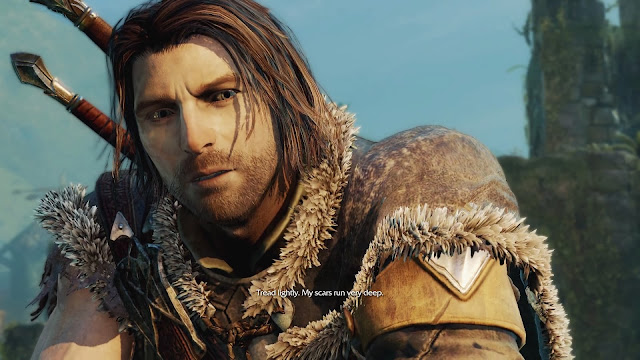ONE GAME TO RULE THEM ALL
We have all played droves of open-world adventures before. You know the formula: action, stealth, random loot, endlessly respawning enemies, climbing mechanics, collectibles, quest markers, a generic story — the list goes on. How can Middle-earth: Shadow of Mordor, built almost entirely out of these recycled parts, manage to engage me so thoroughly?
The answer lies in execution.
Shadow of Mordor contains nearly every open-world trope in the book, but presents them through mechanics tuned to near perfection and silky-smooth controls. Just as importantly, it doesn’t overstay its welcome. My playthrough clocked in at a “mere” 24 hours, even after going the extra mile to collect pointless trinkets, solve Ithildin door poems, and complete well over half of the optional side content. The game ends long before its core gameplay wears thin — a rarity in the genre.
And it doesn’t just polish and recycle familiar ideas. It introduces something genuinely distinctive, giving the game a strong identity in an overcrowded market. The brilliant Nemesis system procedurally generates an endless horde of enemies, each with unique names, appearances, personalities, strengths, weaknesses, and grudges. As you play, these enemies grow stronger through their victories — until you finally cut them down. While the written storyline and characters feel bland, the Nemesis system creates a compelling, emergent narrative on the side.
Polish, pacing, and inventive enemy design — these three elements elevate what could have been a thoroughly unremarkable game to something memorable, even now as it approaches its tenth anniversary. Never mind that the story doesn’t hook me, or that the characters are shallow. The cinematics are brief and unobtrusive, leaving me free to focus on what actually matters: playing.
You play as Talion, a ranger of Gondor stationed at the Black Gate when it falls to Sauron’s forces, sometime between The Hobbit and The Lord of the Rings. Early on, Talion and his family are executed, and with his dying breath he promises they’ll reunite in the afterlife. Fate, however, has other plans.
Talion awakens as a restless spirit on the very spot where he died, bound to another spectral being — an amnesiac elf as confused by the situation as Talion himself. Together, they set out to avenge Talion’s death while uncovering the elf’s true identity. Without spoiling too much, he turns out to be a pivotal figure in Middle-earth lore, and he’s far from the only familiar name you’ll encounter.
Once the introduction is over, the game quickly reveals its heavy inspiration from Assassin’s Creed. Fortunately, Shadow of Mordor outshines its source in almost every mechanical aspect. Combat, stealth, and traversal feel tighter and more responsive, and the bite-sized mission structure gives you ample freedom to carve out your own legend. While the world design lacks aesthetic splendor, it functions beautifully as a playground — quick to traverse, easy to exploit, and perfectly suited to its systems.
At the heart of it all is the Nemesis system. It generates dozens upon dozens of unique Uruk captains and warlords, each competing for dominance within an ever-shifting hierarchy. They form alliances, hold grudges, and pursue personal ambitions — ambitions Talion is more than happy to exploit.
Any Uruk who survives an encounter with you will remember it. If one of them kills you, he rises through the ranks, grows stronger, gains new abilities, bodyguards, and equipment, and greets your resurrection with mocking confidence. From these variables alone, the game spawns an endless supply of emergent side quests, rivalries, and boss fights.
Every encounter is framed like a gladiatorial introduction, complete with dramatic fanfare — reminiscent of the “Maximus!” scene from Gladiator (2000). With enough intel, you can exploit specific weaknesses, sometimes causing enemies to panic or flee. You can assassinate them, manipulate them, or even recruit them, building and leveling an army of Orcs and Uruks and turning them against one another. It’s endlessly entertaining.
The combat system itself is a streamlined variant of Batman: Arkham Asylum, supplemented with ranged and mounted combat. It’s unremarkable — which is another way of saying it works exactly as intended. Sneaking through enemy camps, sabotaging defenses, releasing beasts, and stacking the odds in your favor never gets old.
My complaints are relatively minor. Climbing can feel clunky at times, the ending is rushed and anti-climactic, and the final boss barely qualifies as one. The story leans heavily into cliché and occasionally feels like fan fiction, despite excellent voice acting and strong animation and sound design for its time. The collectible herbs and status effects also feel underutilized.
Still, I wouldn’t have wanted to miss this game. This was my second playthrough, and the skills I’d picked up since the first only made it better. Shadow of Mordor isn’t food for thought — it’s a feast for your lizard brain. The experience scales with player skill, and the systemic chaos of the Nemesis system makes it essential playing for anyone interested in open-world sandbox design.






Comments
Post a Comment